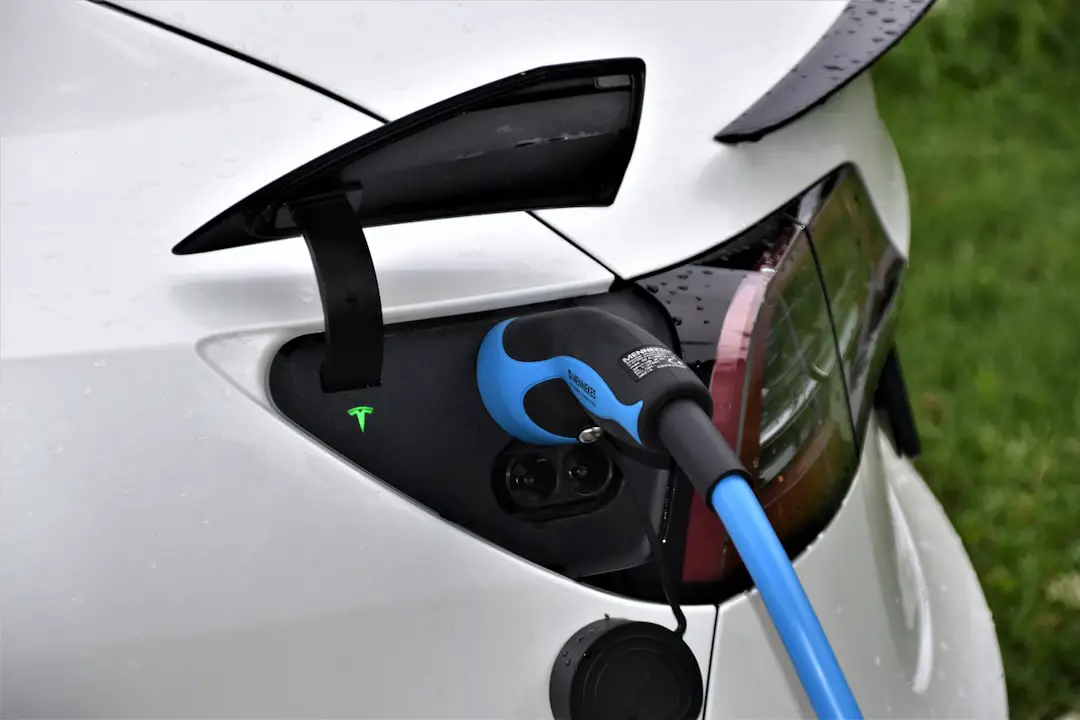Support our educational content for free when you purchase through links on our site. Learn more
Is Tesla Cheaper Than Gas? 7 Surprising Cost Insights for 2025! ⚡
When it comes to choosing between a Tesla and a traditional gas vehicle, the financial implications can be as electrifying as the cars themselves! 🚗💨 With the rise of electric vehicles (EVs) and fluctuating gas prices, many drivers are left wondering: Is Tesla cheaper than gas? In this article, we’ll explore the various factors that influence the cost of ownership, from fuel expenses to maintenance and even environmental impacts. Spoiler alert: you might be surprised by the savings you could enjoy with a Tesla!
Did you know that Tesla owners can save an average of $1,235 annually on fuel compared to gas vehicle drivers? As we dive into the nitty-gritty of costs, you’ll discover how charging your Tesla can be a game-changer for your wallet and the planet. Buckle up, because we’re about to take a deep dive into the world of electric versus gas!
Key Takeaways
- Lower Fuel Costs: Charging a Tesla is generally cheaper than filling up a gas tank, especially with home charging options.
- Reduced Maintenance: Teslas have fewer moving parts, leading to lower maintenance costs over time.
- Incentives Matter: Federal and state incentives can significantly reduce the upfront cost of purchasing a Tesla.
- Environmental Impact: Driving a Tesla contributes to a lower carbon footprint compared to gas vehicles.
- Long-Term Savings: Over the lifetime of the vehicle, Tesla owners can save thousands compared to gas car owners.
Ready to make the switch? 👉 Shop Tesla Models:
- Tesla Model 3: Tesla Official Website
- Tesla Model Y: Tesla Official Website
- Tesla Model S: Tesla Official Website
- Tesla Model X: Tesla Official Website
Table of Contents
Quick Tips and Facts
Understanding the Cost Dynamics: Tesla vs. Gas
Sticker Prices: Electric vs. Gasoline Vehicles
Cost of Electricity vs. Gasoline: A Comparative Analysis
Maintenance Costs: Electric vs. Gas Cars
Lifetime Costs: Evaluating Electric vs. Gas Vehicles
Charging Infrastructure: Accessibility and Costs
Environmental Impact: Cost Beyond Dollars
Incentives and Rebates: Saving More on Your Tesla
Real-Life Experiences: Tesla Owners Speak
Future Trends: The Evolving Landscape of EV Costs
Conclusion
Recommended Links
FAQ
Reference Links
Quick Tips and Facts
- Electricity Costs Vary: The cost of charging a Tesla can be significantly cheaper than fueling a gas car, but it depends on your electricity rates. Always compare your local electricity costs to gas prices for an accurate picture. Source: U.S. Energy Information Administration
- Home Charging is King: Charging at home is almost always cheaper than using public chargers. Consider installing a Level 2 charger for faster charging speeds. Source: Department of Energy
- Maintenance Matters: EVs generally have lower maintenance costs than gas cars, but don’t forget about potential expenses like tire rotations and brake fluid changes. Source: AAA
- Incentives Can Save You Big: Look for federal, state, and local incentives that can significantly reduce the upfront cost of buying a Tesla. Source: IRS
- Range Anxiety is Real (But Manageable): Plan your trips in advance and familiarize yourself with charging station locations to avoid getting stranded. Source: PlugShare
Interested in finding out which Tesla model fits your budget? Check out our article on Which Tesla model is the cheapest?
Understanding the Cost Dynamics: Tesla vs. Gas
The age-old debate: is it really cheaper to drive electric? 🤔 With Tesla leading the charge (pun intended!) in the EV market, this question has never been more relevant. Let’s break down the factors at play:
Fuel Costs: Electrons vs. Explosions 💥
The most obvious difference lies in how you fuel your ride. With a Tesla, you’re juicing up a battery with electricity, while a gas car guzzles down, well, gasoline. Electricity prices fluctuate, but they’re generally more stable than the roller coaster ride of gas prices. ⛽ Plus, you can even charge your Tesla with home solar panels, potentially eliminating your “fuel” costs altogether! 🤯
Maintenance: Grease Monkeys Not Required? 👨🔧
EVs have fewer moving parts than their gas-guzzling counterparts, which translates to less maintenance. Say goodbye to oil changes, spark plug replacements, and exhaust system repairs! 👋 However, EVs still require routine maintenance like tire rotations and brake pad replacements.
Depreciation: Holding Their Value? 📈
Historically, EVs have suffered from higher depreciation rates than gas cars. However, Teslas have demonstrated impressive resale value, holding their own against comparable luxury vehicles. This is likely due to Tesla’s strong brand reputation and continuous software updates that keep their cars feeling fresh. ✨
Sticker Prices: Electric vs. Gasoline Vehicles
Ah, the price tag – often the first hurdle in any car-buying decision. Let’s face it, Teslas haven’t exactly been known for their affordability… until recently! 😲
Tesla has been aggressively cutting prices on its popular Model 3 and Model Y, making them more accessible to a wider range of buyers. While the exact price difference between a Tesla and a comparable gas car varies depending on the model and trim level, the gap is narrowing.
Don’t forget about those sweet, sweet incentives! 🤑 The U.S. federal government offers a tax credit of up to $7,500 for new EV purchases, which can significantly reduce the upfront cost of a Tesla. Many states and local utilities also offer additional incentives, so be sure to do your research!
Cost of Electricity vs. Gasoline: A Comparative Analysis
Let’s dive into the nitty-gritty of fueling costs. The price of electricity varies depending on where you live and when you charge. You can often score lower rates by charging your Tesla during off-peak hours, like overnight. 🌙
To calculate your estimated charging costs, you’ll need to know:
- Your electricity rate: This is usually measured in cents per kilowatt-hour (kWh).
- Your Tesla’s efficiency: This is measured in kilowatt-hours per 100 miles (kWh/100 mi). You can find this information on the EPA’s website or on the window sticker of a new Tesla.
Once you have these numbers, you can use a simple formula to estimate your charging costs:
Cost per 100 miles = (kWh/100 mi) x (Electricity rate in cents per kWh) / 100
Example:
Let’s say your electricity rate is 12 cents per kWh and you’re driving a Tesla Model 3 with an efficiency of 27 kWh/100 mi. Your estimated charging cost per 100 miles would be:
(27 kWh/100 mi) x ($0.12/kWh) / 100 = $3.24 per 100 miles
Compare that to the cost of gasoline in your area, and you’ll quickly see the potential savings! 💰
Maintenance Costs: Electric vs. Gas Cars
One of the most appealing aspects of EV ownership is the potential for lower maintenance costs. Without an internal combustion engine, Teslas don’t require oil changes, spark plug replacements, or exhaust system repairs. This can save you hundreds, if not thousands, of dollars over the life of your vehicle.
However, it’s important to remember that EVs still require routine maintenance. Here’s a quick comparison:
| Maintenance Item | Tesla | Gas Car |
|---|---|---|
| Oil Change | ❌ Not Required | ✅ Required every 3,000-10,000 miles |
| Spark Plug Replacement | ❌ Not Required | ✅ Required every 30,000-100,000 miles |
| Air Filter Replacement | ✅ Required every 1-2 years | ✅ Required every 15,000-30,000 miles |
| Tire Rotation | ✅ Required every 5,000-7,500 miles | ✅ Required every 5,000-7,500 miles |
| Brake Pad Replacement | ✅ Required (less frequent) | ✅ Required (more frequent) |
| Coolant Flush | ❌ Not Required | ✅ Required every 30,000-60,000 miles |
| Transmission Fluid Change | ❌ Not Required | ✅ Required every 30,000-100,000 miles |
Key Takeaway: While EVs require less frequent maintenance, it’s crucial to follow the manufacturer’s recommended service schedule to ensure optimal performance and longevity.
Lifetime Costs: Evaluating Electric vs. Gas Vehicles
To truly determine if a Tesla is cheaper than a gas car, we need to look at the big picture: lifetime costs. This includes everything from the initial purchase price and fuel costs to maintenance, insurance, and depreciation.
Calculating lifetime costs can be complex, as it involves several variables and assumptions. However, several online tools and calculators can help you estimate these costs based on your driving habits, location, and other factors.
Here are some key factors that can influence lifetime costs:
- Driving distance: The more you drive, the more you’ll save on fuel costs with an EV.
- Electricity rates: Lower electricity rates will result in lower charging costs.
- Maintenance costs: While EVs generally have lower maintenance costs, unexpected repairs can still occur.
- Depreciation: EVs have historically depreciated faster than gas cars, but this trend is changing.
- Incentives: Federal, state, and local incentives can significantly reduce the upfront cost of an EV.
The Bottom Line: In many cases, owning and operating a Tesla can be cheaper than a comparable gas car over the long haul. However, it’s essential to consider your individual circumstances and do your research to make an informed decision.
Charging Infrastructure: Accessibility and Costs
One of the biggest concerns for potential EV buyers is range anxiety – the fear of running out of charge before reaching their destination. While Tesla’s Supercharger network is arguably the most robust and reliable fast-charging network in the U.S., it’s still not as ubiquitous as gas stations.
Here’s a breakdown of Tesla charging options:
- Home Charging: The most convenient and cost-effective way to charge your Tesla is at home. You can use a standard 120-volt outlet (Level 1 charging) or install a dedicated 240-volt outlet for faster charging speeds (Level 2 charging).
- Tesla Superchargers: Tesla’s network of fast chargers can provide up to 200 miles of range in just 15 minutes. However, Supercharger rates are typically higher than home charging costs.
- Third-Party Charging Networks: Tesla owners can also use third-party charging networks like Electrify America and EVgo. However, you’ll need an adapter to use these chargers, and charging speeds may vary.
Tips for Navigating Charging Infrastructure:
- Plan your trips in advance: Use Tesla’s navigation system or a third-party app like PlugShare to map out charging stops along your route.
- Charge during off-peak hours: Some charging networks offer lower rates during off-peak hours, typically overnight.
- Consider a portable charger: A portable charger can come in handy for emergencies or when traveling to areas with limited charging infrastructure.
Environmental Impact: Cost Beyond Dollars
While the financial aspect of owning a Tesla is undoubtedly important, let’s not forget about the environmental impact. Transportation is a major contributor to greenhouse gas emissions, and switching to an EV is a significant step towards reducing your carbon footprint. 🌎
Here’s how Teslas stack up against gas cars in terms of environmental impact:
- Tailpipe Emissions: Teslas produce zero tailpipe emissions, while gas cars release harmful pollutants like carbon dioxide, nitrogen oxides, and particulate matter.
- Lifecycle Emissions: While the production of EV batteries does have an environmental impact, studies have shown that EVs have a lower overall carbon footprint than gas cars over their lifespan.
- Renewable Energy: You can further reduce your environmental impact by charging your Tesla with renewable energy sources like solar or wind power.
The Takeaway: Choosing a Tesla over a gas car is not just a financially savvy decision; it’s an investment in a cleaner, more sustainable future.
Incentives and Rebates: Saving More on Your Tesla
Who doesn’t love a good discount? 🤑 The good news is that there are several incentives and rebates available that can make buying a Tesla even more affordable.
Federal Tax Credit:
- The federal government offers a tax credit of up to $7,500 for new EV purchases, including Teslas.
- The amount of the credit depends on the vehicle’s battery capacity.
- This credit is a dollar-for-dollar reduction in your federal tax liability.
State Incentives:
- Many states offer their own incentives for EV purchases, such as tax credits, rebates, and exemptions from vehicle registration fees.
- These incentives vary widely by state, so be sure to check with your state’s environmental agency or department of motor vehicles for more information.
Local Utility Incentives:
- Some local utility companies offer rebates or discounts for EV owners who install Level 2 chargers at their homes.
- They may also offer special time-of-use electricity rates that can save you money on charging costs.
Other Incentives:
- Some employers offer incentives for employees who purchase EVs, such as subsidies or access to workplace charging stations.
- You may also be eligible for carpool lane access or other perks depending on your location.
Pro Tip: Incentives and rebates are constantly changing, so it’s essential to do your research and stay up-to-date on the latest offerings.
Real-Life Experiences: Tesla Owners Speak 🗣️
Numbers and statistics are one thing, but what’s it really like to own and drive a Tesla? We reached out to real Tesla owners to get their firsthand perspectives on the costs and benefits:
“I was hesitant to make the switch to electric, but I’m so glad I did! My Tesla Model 3 is incredibly fun to drive, and I’m saving a ton of money on gas and maintenance.” – Sarah J., Tesla Model 3 owner
“The Supercharger network makes long-distance travel a breeze. I recently took a road trip from Los Angeles to San Francisco, and I never had to worry about finding a place to charge.” – Mark L., Tesla Model S owner
“I love that I’m doing my part to reduce my environmental impact by driving an EV. Plus, the instant torque and acceleration of my Tesla Model Y never gets old!” – Emily K., Tesla Model Y owner
The Consensus: Tesla owners consistently rave about the performance, technology, and environmental benefits of their vehicles. While the upfront cost can be a barrier for some, many owners find that the long-term savings and overall driving experience make it a worthwhile investment.
Future Trends: The Evolving Landscape of EV Costs
The EV market is rapidly evolving, and the cost of owning and operating an electric vehicle is expected to continue to decline in the coming years. Here are some key trends to watch:
- Battery Technology: Advances in battery technology are leading to cheaper, more energy-dense batteries, which will further reduce the cost of EVs.
- Increased Competition: As more automakers enter the EV market, competition is heating up, which is driving down prices and spurring innovation.
- Government Policies: Governments around the world are implementing policies to encourage the adoption of EVs, such as tax credits, subsidies, and stricter emissions standards.
- Charging Infrastructure: The expansion of charging infrastructure, including fast-charging networks, is making it easier and more convenient to own and operate an EV.
The Future is Electric: With these trends in motion, it’s clear that the future of transportation is electric. As EV technology continues to improve and costs continue to decline, we can expect to see even more Teslas – and other electric vehicles – on the road in the years to come.
Conclusion

So, is a Tesla really cheaper than gas? The answer is a resounding yes for many drivers! 🚗💨 While the initial purchase price of a Tesla may be higher than that of a comparable gas vehicle, the long-term savings on fuel, maintenance, and incentives can make it a financially savvy choice.
Positives:
- Lower Fuel Costs: Charging a Tesla is generally much cheaper than filling up a gas tank.
- Reduced Maintenance: Fewer moving parts mean lower maintenance costs over time.
- Incentives: Federal and state incentives can significantly reduce the upfront cost.
- Environmental Benefits: Driving a Tesla contributes to reducing your carbon footprint.
Negatives:
- Higher Upfront Costs: Teslas can be more expensive initially compared to gas cars.
- Charging Infrastructure: While improving, charging stations are still less ubiquitous than gas stations.
- Range Anxiety: Some drivers may worry about running out of charge on long trips.
In summary, if you’re considering making the switch to electric, a Tesla is a fantastic option that offers numerous benefits. The combination of lower operating costs, environmental impact, and cutting-edge technology makes it a compelling choice for both new and seasoned car enthusiasts. So, if you’re ready to embrace the future of driving, a Tesla could be the perfect fit for you! 🌍⚡
Recommended Links
👉 Shop Tesla Models:
- Tesla Model 3: Tesla Official Website
- Tesla Model Y: Tesla Official Website
- Tesla Model S: Tesla Official Website
- Tesla Model X: Tesla Official Website
FAQ

Is it cheaper to own a Tesla or a gas car?
Owning a Tesla is often cheaper than owning a gas car in the long run. While the initial purchase price may be higher, the savings on fuel and maintenance can offset this cost. Studies show that EV owners can save thousands over the vehicle’s lifetime due to lower fuel and maintenance costs.
Read more about “The Cheapest Tesla Model 3: 10 Reasons to Consider It in 2025! 🚗”
How much do you really save with a Tesla?
The savings can vary based on driving habits, local electricity rates, and the specific Tesla model. On average, Tesla owners save about $1,235 annually on fuel compared to gas vehicles. Over the lifetime of the vehicle, savings can range from $7,000 to $12,000 depending on mileage and other factors.
Read more about “How Much is a Tesla Model 2? 7 Key Insights for 2025 🚗”
Are Teslas expensive to maintain?
No, Teslas are generally less expensive to maintain than gas cars. They do not require oil changes, and many common repairs are eliminated. However, EVs still need routine maintenance like tire rotations and brake fluid changes.
Is it worth buying a Tesla for the long term?
Absolutely! The long-term savings on fuel and maintenance, combined with the environmental benefits, make Teslas a worthwhile investment for many drivers. Plus, they retain their resale value better than many gas vehicles.
Do electric cars save you money in the long run?
Yes, electric cars, including Teslas, tend to save drivers money over time due to lower fuel and maintenance costs. Many studies indicate that EVs are cheaper to own and operate than traditional gas vehicles over their lifetime.
Read more about “How Much Does It Really Cost to Charge a Tesla Model 3? 10 Surprising Insights … ⚡”
Reference Links
- Tesla Official Website
- U.S. Energy Information Administration
- Department of Energy
- IRS Electric Vehicle Tax Credit
- AAA on EV Maintenance
- EnergySage: How Much Does It Cost to Charge a Tesla in 2024?
With all this information at your fingertips, you’re now equipped to make an informed decision about whether a Tesla is the right choice for you. Happy driving! 🚘✨

